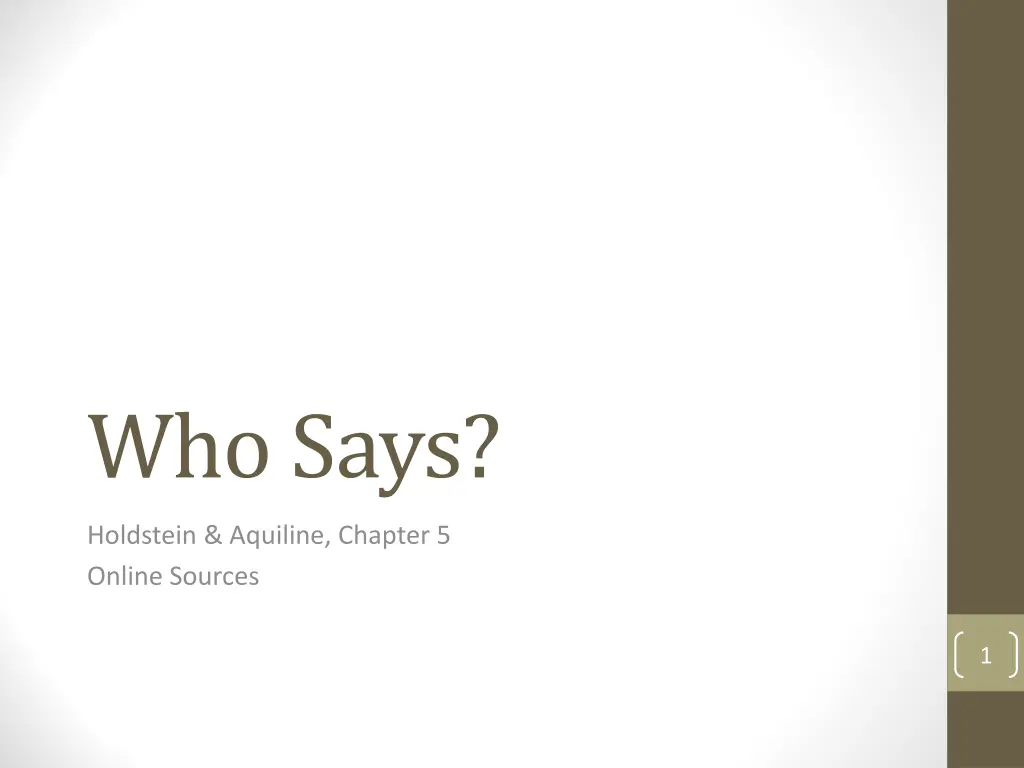
Evaluating Sources for Digital Research
Learn how to evaluate online sources effectively for digital research, from assessing credibility and accuracy to identifying appropriate scholarly sources. Understand the impact of platforms like Google and Wikipedia on intellectual lives.
Download Presentation

Please find below an Image/Link to download the presentation.
The content on the website is provided AS IS for your information and personal use only. It may not be sold, licensed, or shared on other websites without obtaining consent from the author. If you encounter any issues during the download, it is possible that the publisher has removed the file from their server.
You are allowed to download the files provided on this website for personal or commercial use, subject to the condition that they are used lawfully. All files are the property of their respective owners.
The content on the website is provided AS IS for your information and personal use only. It may not be sold, licensed, or shared on other websites without obtaining consent from the author.
E N D
Presentation Transcript
Who Says? Holdstein & Aquiline, Chapter 5 Online Sources 1
Digital research, pros & cons Have Wikipedia and Google in some ways been a detriment to our intellectual lives? (p. 53). Is Carr correct? [Note Jet Ski misspelled again p. 59, 69] But also a boon : How so? More info, but you have to be better at evaluating it You need to understand the older traditions of scholarly research Fake news is perpetuated by confirmation bias. {Note this was wrotten before Fcebook and Twitter began to flag or discontinue accounts thought to be dangerous; they are, remember, private companies.] Don t believe you already know the answer to your research question. [Don t, therefore, write a polemic.] 2
Evaluating sources Your ethos depends on how well you vetted your sources, as well as used them appropriately and honestly Knowing which sources are reliable has gotten more difficult. Why? Web content usually not edited, not filtered [Clay Shirky said we used to filter, then publish, now we publish, then filter] Web content can turn up in Google because it was sponsored/paid for [but you essentially cannot game the system as they say] Almost everything printed had been reviewed by editors, other scholars 3
How to use Google and Wikipedia Google: Know the Boolean terms AND, OR, NOT Try Google Scholar and Google Books] Limit search to .edu, .org, .gov [do a search, go to Settings- >Advanced Search or site:.edu] Wikipedia: Useful to get started generally do not use it or any tertiary source in a Works Cited list. Entries usually do have a bibliography at the end that you can check 4
Appropriate sources What types of sources fit your essay assignment? Do you need quantitative sources (data), qualitative (opinions, observations, focus groups, quotes) or both? Often it s both Know how to recognize scholarly sources: peer-reviewed, written for other scholars/discourse community, use citations, have a works cited list, few ads, black-and-white layouts vs. popular sources Pre-read: look at the table of contents, headings, abstracts (the art of skimming ) 5
Evaluating sources This works for all, but is more important for Web. Note they devised CARS: Credibility: Is the author a faculty member? What credentials/degrees do they have? Could they be biased? Is the publisher credible? [note fake journals we will look at later] If a website, is it .edu or .gov [.org can be more problematic. Why?] Accuracy: Peer-reviewing should assure that it is [but the fake journals fake this process]. If it s current, it s more likely to be accurate i.e. up-to-date. Older work is acceptable but usually to provide context. Reasonable: Unbiased, balanced, [similar to Relevance] Support(ed): There are references/works cited. Has it been cited by others [Google Scholar shows this and most online journals do after the references]. However, many useful articles do not get cited a lot. La Salle version of this is CARDS: Credibility, Accuracy, Relevance, Dates, Sources. 6
